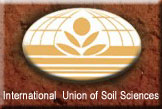 |
18th World Congress of Soil Science
July 9-15, 2006 - Philadelphia, Pennsylvania, USA |
 |
Charles Rice, Kansas State Univ, Dept of Agronomy, 2004A Throckmorton Hall, Manhattan, KS 66506 and Donald Sparks, Univ of Delaware, Dept of Plant and Soil Science, 152 Townsend Hall, Newark, DE 19717.
Soil science is at a critical threshold in identifying new areas for research. Emerging topics – such as climate change, carbon sequestration, water quality, vadose zone transport of nutrients and contaminants, and food security – need strategic research on soil processes. Two workshops in the United States were held in 2005 that relate to soil science. The first sponsored by the National Science Foundation, “Frontiers in Exploration of the Critical Zone” explored research needs and opportunities involving four major questions: 1) what processes in the Critical Zone control fluxes of carbon, particulates, and atmospherically reactive trace gases between the land surface and the atmosphere and how do these processes change over different timescales?; 2) how do important biogeochemical processes and mechanisms at Critical Zone interfaces govern long-term sustainability of soil and water resources?; 3) how do chemical and physical weathering processes impact the establishment of the Critical Zone and how is this weathering engine perturbed by global environmental change?; and 4) how do processes in the Critical Zone that nourish ecosystems change over geologic and human time scales? The second workshop organized by the US National Academies was on “Frontiers in Soil Science Research.” While basic research provides an understanding of fundamental soil processes, increasing trends in land transformation, related environmental considerations, and policy issues require interdisciplinary approaches. An important challenge in soil science is the need for interdisciplinary research involving classical soil science sub-disciplines, namely soil chemistry, soil physics, soil biology, soil mineralogy, and pedology. To successfully address major research needs, soil scientists must collaborate with each other and with scientists in related disciplines. New technologies and sensors now exist that can provide opportunities in soil science to enhance problem-solving abilities and integrate knowledge from associated disciplines (i.e., microbiology, hydrology, ecology, environmental science, geochemistry, geology, atmospheric sciences) to further develop the understanding of soils. The workshop identified: 1) research priorities and potential breakthroughs within soil science; 2) the interdisciplinary and cross-disciplinary research areas in which soil science is involved, particularly in the field of biogeoscience; and 3) technological and computational needs to advance soil science. Outcomes and research needs and recommendations from these two workshops will be presented with particular emphasis on the integration of the biological, physical, geological, and chemical sciences within soil science.



